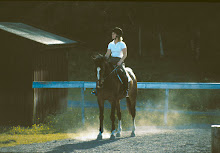My animals mean a lot to me.
There are people out there that claim they can communicate with animals. I must confess that I am fascinated by the possibility, but at the same time quite sceptical.
There are people out there that claim they can communicate with animals. I must confess that I am fascinated by the possibility, but at the same time quite sceptical.
I cannot speak to my animals, but I can quite often guess what kind of mood they are in, and putting words on it makes my daughter and me laugh, often.
I suppose it’s all down to body language, and how you interpret that after many years spent together with that species.
I’m not bad with cats and horses; I’m rusty with dogs and completely at loss with other species. Cows, as an example. Totally unknown territory. Have no idea what they are thinking about.
I envy those who work with horses full time. They have so much more opportunity to learn. I love to read books from people working with horses and solving behaviour problems; Henry Blake, Mark Rashid.
Solving the problems using brain and knowledge of horses, and not resorting to sheer force and violence.
I suppose it’s all down to body language, and how you interpret that after many years spent together with that species.
I’m not bad with cats and horses; I’m rusty with dogs and completely at loss with other species. Cows, as an example. Totally unknown territory. Have no idea what they are thinking about.
I envy those who work with horses full time. They have so much more opportunity to learn. I love to read books from people working with horses and solving behaviour problems; Henry Blake, Mark Rashid.
Solving the problems using brain and knowledge of horses, and not resorting to sheer force and violence.
In the riding hall in one of the old equestrian centres in Sweden, a place that has been used for training of horses for centuries, they have a large sign saying:
"Where the violence starts, the art ends".
"Where the violence starts, the art ends".
The German training scale has relaxation at the very base of the training.
To make a dressage horse work correctly, it is imperative that the horse relaxes. He otherwise tenses up, in the neck, or in an inverted form with a hollow back, bracing against the bit with choppy strides.
The horse is exposed to the rider's moods. An anxious horse is a tense horse.
Now which rider has the most relaxed horse, do you think?
- One that praises the horse at an attempt to make it right, even if the attempt was not perfect
or
- A rider that punishes the horse as long as the response is not correct?
Yes. I want to make a point.
I know that there are many shades of gray between those two.
Think about it. Which horse learns fastest? Which one enjoys the work?
Think about it. Which horse learns fastest? Which one enjoys the work?
I believe that a horse that feels appreciated, feels it can master the tasks given and is not punished if there are misunderstandings, works with joy and heart.
And don't you think that this horse goes just that extra mile for his partner compared to the one that has only learnt to obey because otherwise it gets unpleasant?
I love well formulated words from others.
Let me quote Charles de Kunffy once again:
"We must deserve our horse's attention. We cannot take it for granted. It grows through acts of kindness and rewards. Slow in motion, soft in speech, and soothing in manner, the rider becomes a respected, reliable partner and a source of pleasure to the herd-bound horse"
Ah. Beautiful.
Being kind and sympathetic to the horse doesn't mean you let the horse walk over you.
It doesn't mean you're dumb, or walk around with pink, fluffy stuff between your ears.
Horses that don't behave are potentially dangerous.
We have to correct the horse along the way. But we need to stay calm when we do it.
We have to give clear instructions. Go means go, stop means stop.
I also believe that as a rider I have to strive to improve myself. A good seat and posture give clearer signals, and interfere less with the horse.
I also believe that as a rider I have to strive to improve myself. A good seat and posture give clearer signals, and interfere less with the horse.
But why not have fun along the way?
I believe that when you actively seek to praise your horse, you feel good yourself. Your team of two has achieved something.
I believe that when you actively seek to praise your horse, you feel good yourself. Your team of two has achieved something.
Yesterday I heard a comment from someone that considered dogs more intelligent than horses.
Hmpf.
How do you measure that?
And what is the reason for drawing such a conclusion?
If you are a dog owner, you spend most of the time you are awake in the company of your dog. You learn to know him well. Your dog is very focused on you as a person, and your family is his pack. He has a very clear and easy understandable body language.
Now take the horse.
If you spent the same amount of time with your horse, I bet you would get a larger insight into what your horse thinks. The normal horse spends most of the time together with other horses (should do at least). How much time does the normal horse owner spend to get insight into his horse’s world? or thoughts?
The dog is a predator, just as man.
The horse is a herd living prey animal.
How does that affect the way the animal acts?
I believe it’s a premature conclusion to state that the dog is more intelligent than the horse.
Horses don’t wag the tail. They are large animals, but speak with small letters and soft voices. They evaluate situations from a prey animal’s point of view.
It’s up to us to tune in and receive the message.
We are supposed to be the intelligent ones, remember?
*sigh*
I don't believe that comment was very intelligent.




























7 comments:
Mycket bra skrivet, kul att läsa.
Jag sålde en häst till Kongsberg en gång. Har tappat kontakten, men jag tror den tävlar hoppning. Mvh irene
Du måste vara ett språkgeni! Engelska hur enkelt som helst, svenska lika bra. ???
Hehe. Jag är svensk, bara miljöskadad efter att ha bott i Norge i 22 år...uppväxt mest i Åmål, men har också bott i Bohus, Lödöse och Trollhättan när jag var mindre.
OK, förklarar lite men var har du fått engelskan från då?
Skola, jobb och interesse ;-)
Horses are definitely more intelligent than dogs. They are more thoughtful and introspective. Gaze into their eyes and you can see there's a lot going on there. I love dogs but there's just no comparison.
Hi Pet Chatter. Thanks for your comment :-)
I believe that there are all sorts really. Just as we have more or less intelligent people, we also have more or less intelligent horses and dogs.
I am just thinking that the original comment was based on how we _percieve_ the animal, more than what the animal is.
I totally agree with you; I also believe that there is a lot going on in the mind of the horse. But it's not that obvious. And I think it is an - how shall I put it? arrogant? - comment because I believe that the person behind it didn't take the time/effort necessary to find out how the horses communicate, or what goes on in the horses' minds.
How do we measure intelligence?
If the art of survival (and in that adaption to changes) is a good measure, which I believe it is, then the horse has done a good job IMO.
Post a Comment